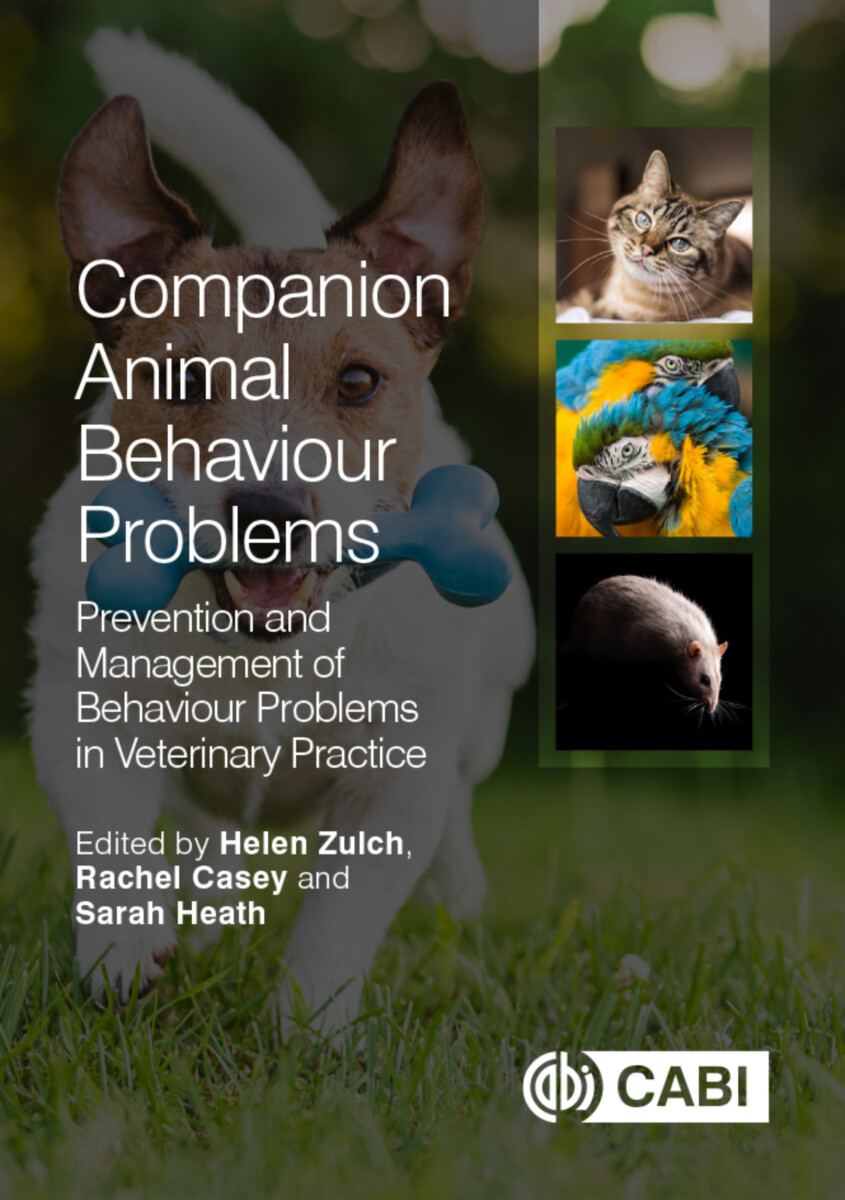Companion Animal Behaviour Problems
Prevention and Management of Behaviour Problems in Veterinary Practice
- Publisher
CABI - Published
9th September 2022 - ISBN 9781780643465
- Language English
- Pages 352 pp.
- Size 6" x 9"
- Publisher
CABI - Published
9th September 2022 - ISBN 9781780643458
- Language English
- Pages 352 pp.
- Size 6" x 9"
Behavior problems are a significant cause of companion animal relinquishment and euthanasia. This book provides up-to-date information about animal behavior as well as practical advice on how veterinary practice professionals can manage undesirable animal behavior and give down to earth, appropriate and trusted advice to owners. This book:
- Covers the important aspects of behavior in dogs, cats, rabbits and rodents, parrots and birds, as well as how this behavior has adapted to the domestic environment.
- Discusses the role of the veterinary practice in improving the emotional experience of animals attending the veterinary practice, including practice design, socialization classes for young animals and effective communication with owners.
- Covers the clinical decision-making process in managing the signs of undesirable behavior, appropriately handling pets in the practice to minimize distress, as well as: behavioral first aid, referral to a specialist, medical influences on behavior and decisions about euthanasia.
Chapter 1: Introduction. Helen Zulch.
Part I: The Influence of the Domestic Environment on Behaviour
Chapter 2: Dog Behaviour. David Ryan.
Chapter 3: Cat Behaviour. Jon Bowen.
Chapter 4: Rabbit and Rodent Behaviour. Anne McBride and Emma Lightfoot.
Chapter 5: Parrot Behaviour. Clare Wilson.
Part II: The Veterinary Practice Role in Preventing Behaviour Problems
Chapter 6: The Role of the Practice Environment. Caroline Bower.
Chapter 7: The Role of the Practice Staff. Francesca Riccomini and Claire Hargrave.
Chapter 8: What Every Puppy Owner Should Know. David Appleby.
Chapter 9: What Every Kitten Owner Should Know. Jon Bowen.
Chapter 10: What Every Rabbit and Rodent Owner Should Know. Emma Lightfoot and Anne McBride.
Chapter 11: What Every Parrot Owner Should Know. Clare Wilson.
Chapter 12: Running Puppy Parties and Kitten Evenings. Emily Blackwell.
Part III: Behavioural First Aid
Chapter 13: Identifying Problems. Amanda L. Roshier.
Chapter 14: Appropriate Handling of Challenging Patients. Stephanie Hedges.
Chapter 15: Considering Medical Influences on Behaviour. Helen Zulch.
Chapter 16: Making the Decision Whether to Treat, Rehome or Euthanase. Julie Bedford.
Chapter 17: First-Aid Advice for Common Behavioural Signs: Dogs. Caroline Warnes.
Chapter 18: First Aid Advice for Common Behavioural Signs: Cats. Trudi Atkinson.
Chapter 19: First Aid Advice for Common Behavioural Signs: Rabbits and Rodents. Emma Lightfoot and Anne McBride.
Chapter 20: First Aid Advice for Common Behavioural Signs: Parrots. Clare Wilson.
Chapter 21: Arranging Referral: Who To and When. Trudi Atkinson.
Chapter 22: The Role of the Referring Vet in Case Management. Emma Brown.
Helen Zulch
Helen is a veterinarian, a Diplomat of the European College of Animal Welfare and Behavioral Medicine (BM) and a Royal College of Veterinary Surgeons Recognized Specialist in Behavioral Medicine. She is currently the Head of Professional Development in Canine Behavior at Dogs Trust where she has responsibility for staff education and professional development in dog behavior and training. She is also a Visiting Fellow in the School of Life Sciences, University of Lincoln, UK and an Honorary Assistant Professor at the University of Nottingham School of Veterinary Medicine and Science, UK. Helen worked in a range of areas of veterinary medicine before moving into companion animal behavior in 1998. She has lectured on undergraduate and postgraduate programs and co-developed the University of Lincoln MSc in Clinical Animal Behavior, a program that she led for a number of years. She has spent many years consulting for pet owners and engaging with research across a range of areas in animal behavior, learning and cognition. She is a speaker at national and international events, has authored books and book chapters as well as scientific articles and was instrumental in developing the Life Skills for Puppies program. Over the years Helen has participated and competed in a range of dog sports, although currently she and her dogs prefer more leisurely countryside rambles.
Rachel Casey
Rachel is Director of Canine Behavior and Research at Dogs Trust, the UK’s largest dog charity. She is a RCVS and an EBVS® European Veterinary Specialist in Behavioral Medicine and an EBVS® European Veterinary Specialist in Animal Welfare, Science, Ethics and Law. She has research interests in canine welfare science, including identification of risk factors for undesired behaviors. Rachel also oversees community programs aimed at preventing behavior problems, and the behavioral rehabilitation of dogs in rehoming centers.
Sarah Heath
Sarah is both an RCVS and an EBVS® European Veterinary Specialist in Behavioral Medicine, as well as a Certified Clinical Animal Behaviorist. She was made a Fellow of the Royal College of Veterinary Surgeons in recognition of her work in establishing behavioral medicine as a veterinary discipline.


